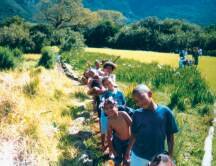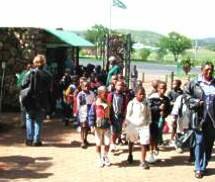{menu}
Annual Review
2000-2001
Introduction
Chairman's Report
Gardens
Research
Education
Marketing
HR & Finance
Environmental Education & Interpretation Services |
|||
The Environmental Education programmes in the Kirstenbosch, Pretoria and Witwatersrand National Botanical Gardens focus on guided school visits, teacher training and educational support for outreach greening projects. Our programmes aim to support the school curriculum and explore new and innovative ways of ensuring that our programmes, and by extension the Gardens, become increasingly relevant and more accessible to all South Africans. The guided schools programme in each of the gardens is supported by a team of dedicated and committed Assistant Education Officers. The Assistant Education Officers enable us to increase numbers without compromising on the quality of our programmes. Teacher Development programmes are becoming increasingly important in the light of the transformation in education. Organisations like the NBI have an important role to play with regard to teacher development and support and also to ensure that environmental education is effectively integrated into the school curriculum. The Kirstenbosch Outreach Greening Programme is a cross-directorate activity linking the Gardens Directorate and Education. It is well established and acts as an inspiration for fledgling outreach greening activities initiated in schools and communities in the other Gardens. In an attempt to facilitate closer collaboration between staff in different Gardens, a number of joint projects have been initiated. These have resulted in extensive sharing of expertise and experience as well as the standardisation of the Assistant Education Officer policy and sections of the training manual. The Environmental Education staff in the Pretoria and Witwatersrand National Botanical Garden have also been working together to facilitate the NBI/UNESCO Teacher Capacity Building: Skills Development Through Environmental Education workshops. During the year under review, certificate ceremonies were held at both gardens and 77 teachers graduated. These workshops have been instrumental in the forging of partnerships between the NBI, UNESCO, the Gauteng Department of Education, teachers and principals of schools participating in the project. PRETORIA NBG The Schools Environmental Education programme in the Pretoria Garden revealed a steady increase in the number of learners visiting the Garden. One of the most popular events was the Arbor Programme. During this programme, staff from the Education Section, the National Herbarium and the Garden Directorate facilitated a sponsored programme for learners focusing on the importance of indigenous plants and botany. A total of 3538 learners visited the Garden for guided programmes while an additional 1848 came on unguided outings. The Education Officer in collaboration with Food and Trees for Africa facilitated a number of Urban Greening Workshops for approximately 160 teachers and community leaders. Another highlight was the workshops, run in collaboration with Johannesburg City Parks, to train community members to participate in projects to clear alien invader plants. Our Education Officer presented a workshop titled, "Why Indigenous" which highlighted the advantages of indigenous plants and the negative effects of invader species on our environment. KIRSTENBOSCH NBG During the period under review, several exciting events occurred at the environmental education centre at Kirstenbosch. A total of 8 542 learners visited the Garden for the guided schools' programme. A total of Education staff visited Rondevlei Nature Reserve to observe their schools' programme. The Western Cape Primary Science Programme (WCPSP) Workshops presented further possible options for teachers regarding the NBI's schools' programme. An education officer from the Missouri Botanical Garden visited Kirstenbosch as part of the exchange programme undertaken by these two gardens and shared aspects of the schools' programme offered by the Missouri Garden. Several self-guided 'previsit' teacher workshops were presented. The purpose of these workshops was to train and enable teachers to use the Kirstenbosch NBG as a teaching and learning resource to reinforce their syllabus and curriculum. Four themed workshops, attended by 51 teachers, were run during the year. A one-day workshop discussing interpretation within the NBI was held at the Witwatersrand NBG on Saturday, 17 March 2001. The product of this meeting is an Interpretation Policy for the NBI, recommending that each garden, where possible, have one staff member dedicated to Interpretation. The overall interpretive theme for the NBI that was agreed on at the meeting was: "Indigenous plants enrich our lives-let's care for them!". This interpretation workshop was a response to the recommendations which were put forward by the External Review panel.
|

